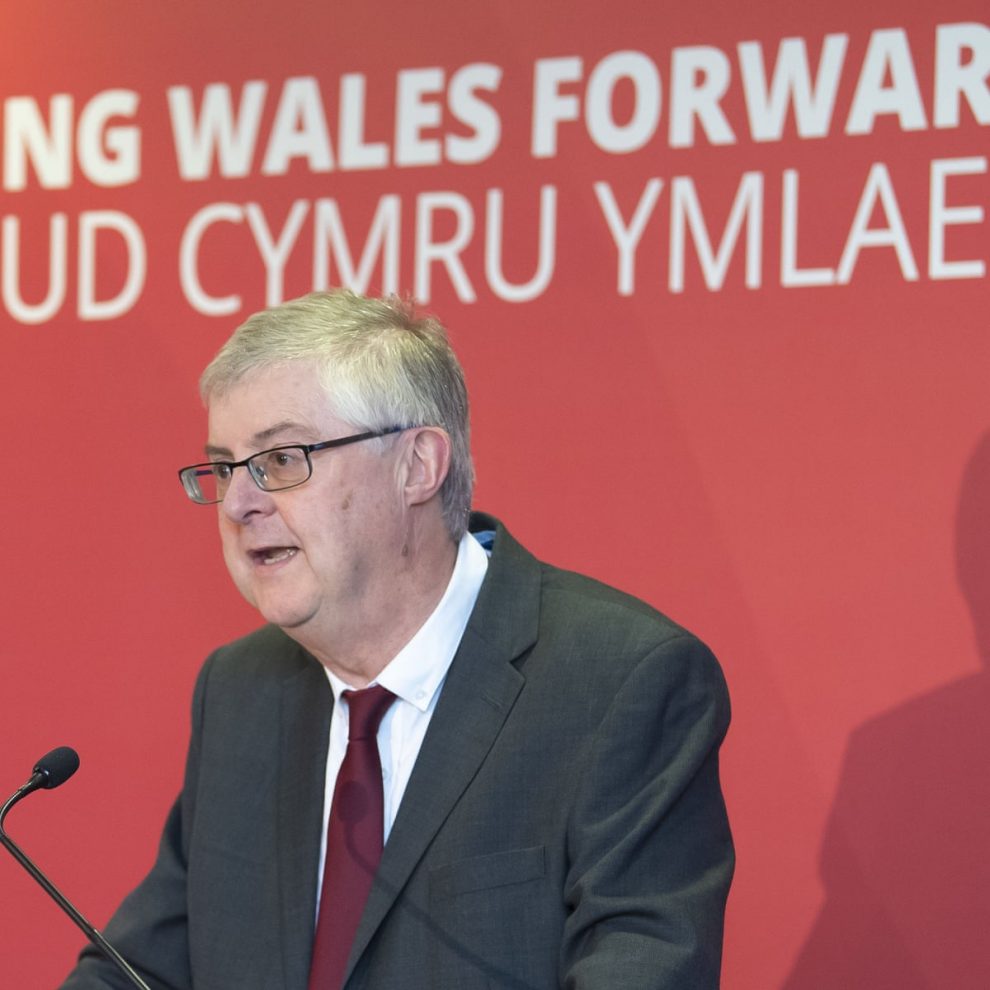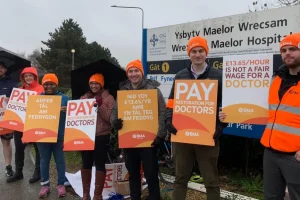THE FIRST MINISTER, Mark Drakeford, has sparked debate and interest by saying that his government will look to carry out a pilot scheme of Universal Basic Income here in Wales.
It is an idea that has long been discussed amongst political parties – and has mostly been rejected – so supporters are celebrating the First Minister’s comments.
In a radio interview last week, First Minister Mark Drakeford revealed that a pilot would go ahead. However, a spokesperson for the Welsh Government has admitted that it would need support from the UK government as the welfare system is not devolved.
“A basic income pilot is one of the specific responsibilities of our new social justice minister,” Drakeford said.
“It will have to be carefully designed, it will draw on the experience of attempted pilots in Scotland, but I have a very longstanding interest in basic income. I hope we will be able to mount an experiment here that will test whether the claims that are made for a basic income approach are actually delivered.
“We’ll do it on a cross-party basis. There are 25 members of the Senedd in different parties who have expressed an interest in it. I want to do it on that broad basis and design the best possible pilot.”
However there are more questions than answers about what it is, and how, or if, it is possible.
A Welsh government spokesperson said: “In principle the idea of a universal basic income has its benefits. To introduce this in Wales would require an active commitment from the UK government as the welfare system is not devolved.
“Our immediate focus is on supporting employers and workers through the current Covid crisis and driving forward plans for future recovery.”
The system proposes that every citizen, regardless of their means, receives a sum of money regularly and for life to cover the basic cost of living. Its proponents argue it will alleviate poverty and give people time to retrain and adapt to changing workplaces, be more creative and become more active and engaged.
In the run-up to the elections in England, Wales and Scotland, the UBI Lab Network, a worldwide group of activists, researchers and citizens, asked candidates to sign a pledge promising to put pressure on governments and councils to launch trials. Twenty-five candidates who won seats in the 60-strong Senedd signed up, according to the organisation.
Jonathan Rhys Williams of UBI Lab Wales said: “Wales has leapt to the forefront of the basic income movement. There are now 25 elected members of the Senedd who have backed our pledge for UBI – nearly half of our elected representatives and clear majority among the progressive parties.
“The Welsh government must listen to those members of the Senedd and the general public who back this idea, and make the case for the necessary powers to implement a trial that is representative of Wales. This could be the first minister’s Bevan moment.”
The new minister for social justice – Jane Hutt, a close ally of Drakeford’s – will be asked to work on the pilot.
Under a UBI scheme, every citizen – regardless of their income or means – receives regular sums of money to cover the basic cost of living.
Its supporters argue that it can alleviate poverty, and give people more time to retrain and adapt to changing workplaces – as well as making people more active, creative and engaged.
Earlier this week, a Welsh government spokesperson said: “In principle, the idea of a universal basic income has its benefits. To introduce this in Wales would require an active commitment from the UK government as the welfare system is not devolved.”
But, in a radio interview on Friday, Drakeford went further. When asked if he would commit to a pilot, he replied: “Yes”.

Wales’ future generations commissioner, Sophie Howe, called for a pilot previously. She said: “Signalling basic income as a priority for the new government is an incredibly significant commitment by the first minister to tackling Wales’ poverty and health inequalities – which cause lasting damage to the health and prospects of individuals, families and communities.
“It’s a huge moment for the campaign, which I’ve been proud to be a part of, and the growing support for a fairer way of allowing people to meet their basic needs.
“The current system isn’t working – Wales’ commitment to exploring a basic income once again proves it’s often the small countries that can be world leading and make the biggest changes.”
Jane Dodds, the leader of the Welsh Liberal Democrats and newly elected member for Mid and West Wales, said: “UBI has the potential to transform the lives of people in Wales. It would ensure that people are lifted out of poverty, stress and uncertainty, and that money is put into our economy to create jobs and allow people to take on caring responsibilities and other options to enhance their lives.
“I want to work with parties across Wales to look at how we trial a UBI system in Wales to ensure we put the recovery from Covid of our economy and our mental health in this sixth Senedd.”
What is a basic income?
According to Citizens Income, the cash given to residents under UBI would be:
Unconditional : A Citizen’s Basic Income would vary with age, but there would be no other conditions: so everyone of the same age would receive the same Citizen’s Basic Income, whatever their gender, employment status, family structure, contribution to society, housing costs, or anything else.
Automatic : Someone’s Citizen’s Basic Income would be paid weekly or monthly, automatically.
Nonwithdrawable : Citizen’s Basic Incomes would not be means-tested. If someone’s earnings or wealth increased, then their Citizen’s Basic Income would not change.
Individual : Citizen’s Basic Incomes would be paid on an individual basis, and not on the basis of a couple or household.
A right of citizenship : Everybody legally resident in the UK would receive a Citizen’s Basic Income, subject to a minimum period of legal residency in the UK, and continuing residency for most of the year.
Jonathan Rhys Williams of UBI Lab Wales explained: “Basic income is the idea that everyone is given a fixed, regular and unconditional payment regardless of their income, wealth or employment status.
“It would mean that no-one is left behind and that there is a safety net to catch everyone in times of trouble.
“There is much debate about how we approach trialling a basic income. But it is said that a basic income could encourage a wave of entrepreneurialism.
“How many people have dreamt of setting up their own business but haven’t taken that leap of faith because they have nothing to fall back on?
“It’s a huge gamble for them.”
Jonathan Rhys Williams went on to say: “By offering that safety floor we may find that people are prepared to go it alone, which could stimulate the local economy and make those left behind towns and cities more attractive for investment.
“We already know from past trials around the world that basic income has a significant positive effect on physical and mental wellbeing.
“For example, the recent Finnish pilot, where people were given €560 per month, showed that basic income recipients were more satisfied with their lives and experienced less mental strain than the control group.
“The Stockton, California, trial showed that recipients were less anxious and depressed, as well as less likely to feel fatigue or body pain associated with poor mental health.
“By running a basic income trial with 10,000 participants in Wales, we would be able to see whether it has the same effect on health here.
“Better health overall will result in a significant saving to the public purse – something that isn’t talked about nearly enough in the basic income debate.
“And, of course, a healthier population means a more productive workforce.
“These are just some of the possible effects a full trial could help us learn from.
“Other potential impacts could include a reduction in transport use, which is essential for tackling climate breakdown.
“The impacts a basic income could have on people looking to re-skill, which feeds into the debate around automation. The impact that a basic income could have for those providing care for loved ones.”
How much is being offered?
How much the pilot scheme will be giving to the lucky recipients has not yet been revealed.
However, a look at previous trials across the world could indicate how much is paid out – and the results vary.
Finland ran a two-year universal basic income pilot from 2017 to 2018, in which the Government gave €560 (£482) per month to 2,000 unemployed people aged between 25 and 58.
Spain also held a trial run in 2017, with the “B-MINCOME” experiment handing out up to $1,968 per month to 1,000 households in Barcelona’s poorest districts.
The same year, the Netherlands kicked off a basic income study, handing £1,050 per month to 250 recipients – with some having to do volunteer work for the cash, while for others it was unconditional.
n Alaska, it’s not called a universal basic income but the state gives each resident a cheque every year, worth between $1,000 and $2,000.
Back in Wales, it is believed the plans are still in the planning stage, so how much will be paid out is likely not decided yet.
Mr Drakeford said a pilot would “need to be carefully designed to make sure that it is genuinely adding income for the group of people we are able to work with”.
He added: “It’ll have to be a pilot because we don’t have all the powers in our own hands to do it on our own.
“It’ll have to be carefully crafted to make sure that it is affordable and that it does it within the powers available to the Senedd.
“We need to make an early start on designing the pilot to make sure that we have the best chance of operating a pilot that allows us to draw the conclusions from it that we would all want to see.”


















Add Comment